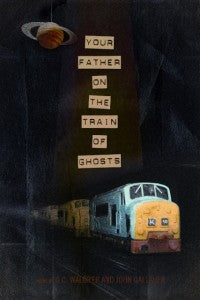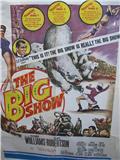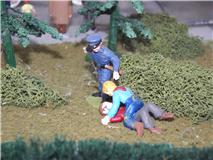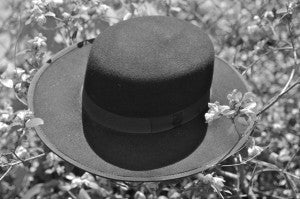 [/caption]
After exchanging poems via email at a sometimes furious rate for a year, John Gallaher and G.C. Waldrep were left with the task of turning this abundance of poems into a more manageable manuscript. In part three of a six part series, John Gallaher and G.C. Waldrep return to discuss the collaborative effort involved in shaping Your Father on the Train of Ghosts into a cohesive collection that remained true to the spirit of writing the poems.
You can read earlier parts of the conversation here:
Part 1: "On the Conservative vs. the Real"
Part 2: "Don’t Answer the Door (or Do)"
[/caption]
After exchanging poems via email at a sometimes furious rate for a year, John Gallaher and G.C. Waldrep were left with the task of turning this abundance of poems into a more manageable manuscript. In part three of a six part series, John Gallaher and G.C. Waldrep return to discuss the collaborative effort involved in shaping Your Father on the Train of Ghosts into a cohesive collection that remained true to the spirit of writing the poems.
You can read earlier parts of the conversation here:
Part 1: "On the Conservative vs. the Real"
Part 2: "Don’t Answer the Door (or Do)"
On the Plenitude
John Gallaher: Your Father on the Train of Ghosts is a little over 200 pages, culled from more than twice that in manuscript. We accumulated a lot of poems over the months of our collaboration. On the one hand, it feels like a long book to me when I read it—and usually people like books of poems to be much shorter than that—but other times, when I’m reading it, I think of all the poems that aren’t there, and it seems short. The competing impulses, to take poems out, and to keep poems in, kept tapping on my shoulder throughout the process. I think about these competing impulses when we give readings from the book. When you asked in the last post, “To what extent does each poem imbibe or express its ancestors,” I thought of this again. To what extent do the poems of YFOTTOG imbibe or express each other, and the ones that aren’t there? G.C. Waldrep: We kept trimming the original manuscript of 700+ pages to something we hoped would be publishable, even readable (!). We even considered disentangling the poems and publishing separate volumes under our own names. But that seemed untrue and unfair to the generative process.
As for the ultimate length, it seemed to me that nearly every volume of poetry I encounter these days (with the exception of a few Selected compilations) is of a length any intelligent reader can sit down and get through in an hour or two, a single sitting. It’s the tyranny of the 48-to-64-pp. manuscript submission protocol. Since there were two of us, it seemed appropriate to me that YFOTTOG have something of a “double album” quality. And I wondered what would happen if we made the book long enough—just barely long enough—to frustrate that tendency of reading poetry books as bite-sized pieces. Rightly or wrongly, I wanted a book that would force a reader to read some of it, then put it down, and then return to it.
G.C. Waldrep: We kept trimming the original manuscript of 700+ pages to something we hoped would be publishable, even readable (!). We even considered disentangling the poems and publishing separate volumes under our own names. But that seemed untrue and unfair to the generative process.
As for the ultimate length, it seemed to me that nearly every volume of poetry I encounter these days (with the exception of a few Selected compilations) is of a length any intelligent reader can sit down and get through in an hour or two, a single sitting. It’s the tyranny of the 48-to-64-pp. manuscript submission protocol. Since there were two of us, it seemed appropriate to me that YFOTTOG have something of a “double album” quality. And I wondered what would happen if we made the book long enough—just barely long enough—to frustrate that tendency of reading poetry books as bite-sized pieces. Rightly or wrongly, I wanted a book that would force a reader to read some of it, then put it down, and then return to it.
 Or, to put it another way: Charles Simic writes, “A toy is a trap for dreamers. The true toy is a poetic object.” Simic goes on to describe visual artist Joseph Cornell’s central question as “How to construct a vehicle of reverie, an object that would enrich the imagination of the viewer and keep him company forever.” I wanted a book that was simultaneously a trap, a toy, an object, and a vehicle—a companion and a “forever.”
Or, to put it another way: Charles Simic writes, “A toy is a trap for dreamers. The true toy is a poetic object.” Simic goes on to describe visual artist Joseph Cornell’s central question as “How to construct a vehicle of reverie, an object that would enrich the imagination of the viewer and keep him company forever.” I wanted a book that was simultaneously a trap, a toy, an object, and a vehicle—a companion and a “forever.”
 JG: And I was just looking for the restroom. Ah, the old jokes are the best ones. But that’s also part of the toy, isn’t it? The toy that can kill you, I think you referred to it as once when we were driving from The National Circus Hall of Fame Museum in Peru, Indiana? That’s one of the things I enjoyed the most about writing this book, the way, in collaboration, various strands of meaning, of idiom and intent, weave in and around each other, so that either one of us might have written something like “Driving from the National Circus Hall of Fame Museum in Peru, Indiana” and the other wouldn’t know if that was an invented or real place, would then populate it with little painted figurines of children fighting, covered in cobwebs. It’s another version of the door:
JG: And I was just looking for the restroom. Ah, the old jokes are the best ones. But that’s also part of the toy, isn’t it? The toy that can kill you, I think you referred to it as once when we were driving from The National Circus Hall of Fame Museum in Peru, Indiana? That’s one of the things I enjoyed the most about writing this book, the way, in collaboration, various strands of meaning, of idiom and intent, weave in and around each other, so that either one of us might have written something like “Driving from the National Circus Hall of Fame Museum in Peru, Indiana” and the other wouldn’t know if that was an invented or real place, would then populate it with little painted figurines of children fighting, covered in cobwebs. It’s another version of the door:
PARABLE OF THE DOOR
You tell what’s on the other side of the door by the odor of the door.
There are rules to this game, you feel sure. You tap the crumbling edge of the off-season Olympic pool impatiently, with the toe of your left foot.
All around you, fossil fuels are being liberated from the crushing burden of use.
You want to be responsible for things that are necessary, things nobody else does:
finishing the potato cannon. Wearing white at unfashionable moments, like funerals.
For there to be a funeral, someone must die— That’s one rule, you’re guessing. And the politicians at the viewing, all crowded around the little tables, with their little trays of credit cards and baked brie with honey.
You get as close as you can to the door. You don’t smell anything, but maybe there’s a sort of humming noise coming from the other side. You’re not sure.
All the photographs in your wallet are of politicians, honey running down their chins,
and of you, with your mouth sewn shut.
You’re waiting for someone, for the right season, only there’s this terrible pressure coming from somewhere.
Your swimsuit feels tight. It’s winter. You pretend there are orders at the factories.
I want what you’ve got in your hands.
[caption id="attachment_401" align="alignleft" width="240" caption="G.C. Waldrep's Hat. BOA Poet Hat."] [/caption]
G.C. Waldrep’s previous collections of poetry include Goldbeater’s Skin (2003), winner of the Colorado Prize; Disclamor (BOA, 2007); and Archicembalo (2009), winner of the Dorset Prize. His work has appeared in many journals, including Poetry, Ploughshares, APR, Boston Review, New England Review, Threepenny Review, Colorado Review, Tin House, Harper’s, and The Nation, as well as in Best American Poetry 2010. He was a 2007 National Endowment for the Arts Fellow in Literature and received a 2008 Gertrude Stein Award for Innovative American Poetry. His anthology of creative, critical, and personal responses to the life and work of Paul Celan, co-edited with Ilya Kaminsky, is forthcoming from Marick Press. He lives in Lewisburg, Pa., where he teaches at Bucknell University, directs the Bucknell Seminar for Younger Poets, and serves as Editor-at-Large for The Kenyon Review.
[caption id="attachment_1212" align="alignleft" width="103" caption="John Gallaher. BOA poet. "]
[/caption]
G.C. Waldrep’s previous collections of poetry include Goldbeater’s Skin (2003), winner of the Colorado Prize; Disclamor (BOA, 2007); and Archicembalo (2009), winner of the Dorset Prize. His work has appeared in many journals, including Poetry, Ploughshares, APR, Boston Review, New England Review, Threepenny Review, Colorado Review, Tin House, Harper’s, and The Nation, as well as in Best American Poetry 2010. He was a 2007 National Endowment for the Arts Fellow in Literature and received a 2008 Gertrude Stein Award for Innovative American Poetry. His anthology of creative, critical, and personal responses to the life and work of Paul Celan, co-edited with Ilya Kaminsky, is forthcoming from Marick Press. He lives in Lewisburg, Pa., where he teaches at Bucknell University, directs the Bucknell Seminar for Younger Poets, and serves as Editor-at-Large for The Kenyon Review.
[caption id="attachment_1212" align="alignleft" width="103" caption="John Gallaher. BOA poet. "] [/caption]
John Gallaher’s previous collections of poetry include The Little Book of Guesses (2007), winner of the Levis poetry prize, and Map of the Folded World (2009). His work has appeared in such journals as Field, Denver Quarterly, Ploughshares, New American Writing, Colorado Review, and The Kenyon Review, as well as in The Best American Poetry 2008. In 2010, he won the Boston Review poetry prize. He is currently co-editor of The Laurel Review, and, with Mary Biddinger, The Akron Series in Contemporary Poetics.
[/caption]
John Gallaher’s previous collections of poetry include The Little Book of Guesses (2007), winner of the Levis poetry prize, and Map of the Folded World (2009). His work has appeared in such journals as Field, Denver Quarterly, Ploughshares, New American Writing, Colorado Review, and The Kenyon Review, as well as in The Best American Poetry 2008. In 2010, he won the Boston Review poetry prize. He is currently co-editor of The Laurel Review, and, with Mary Biddinger, The Akron Series in Contemporary Poetics.

